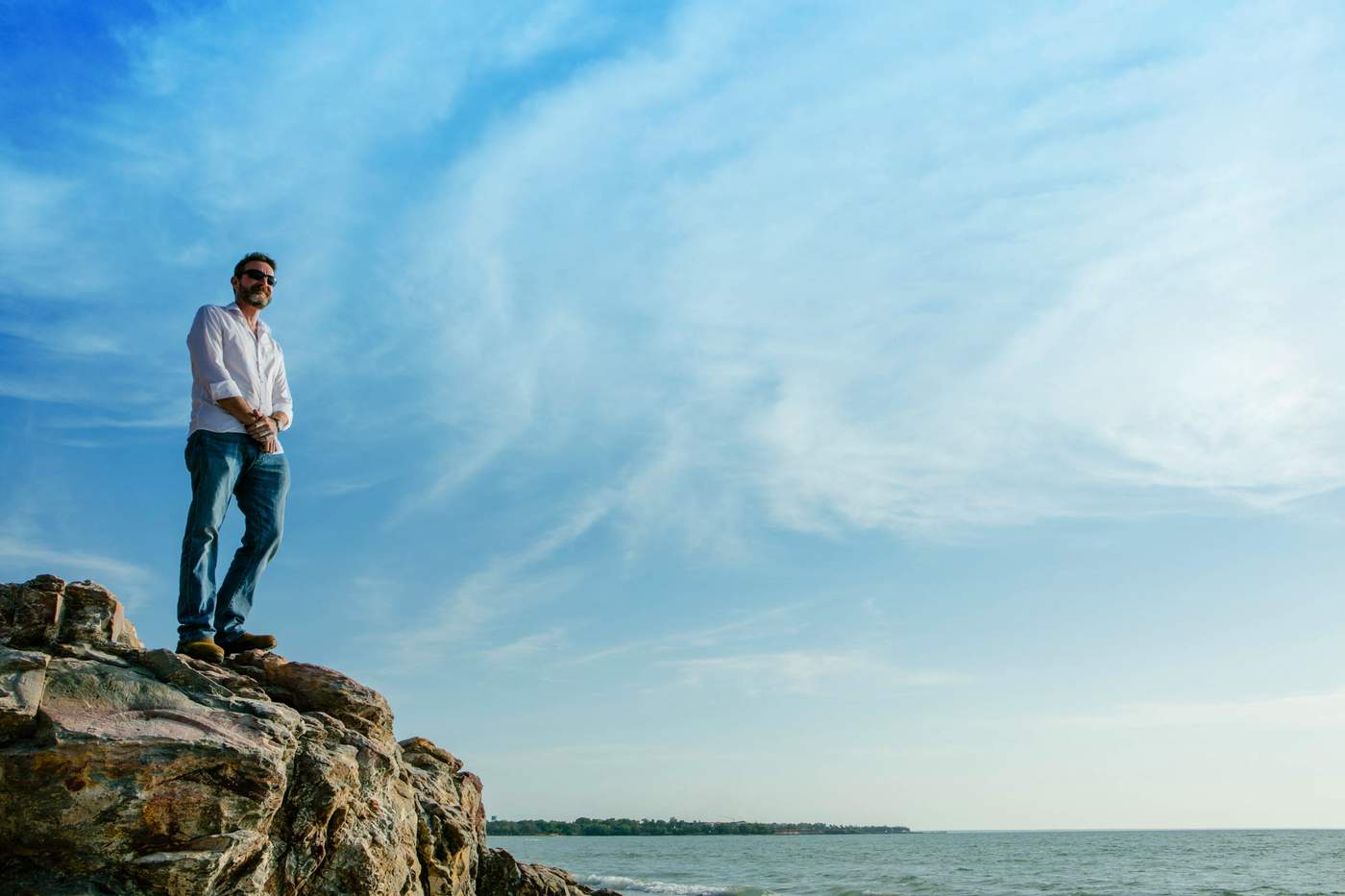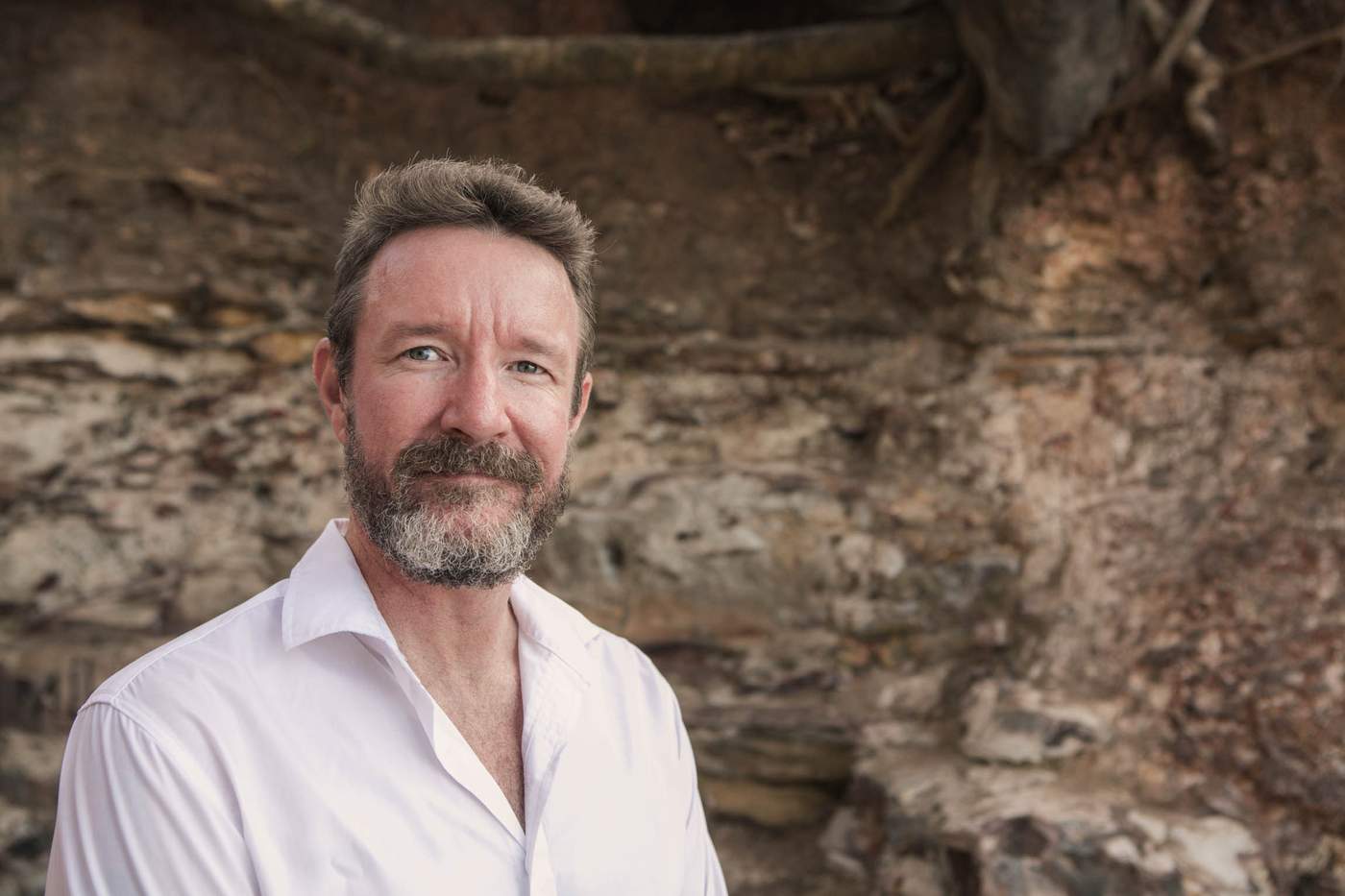
When the head of the NT Labor Party disappeared overnight to help Kurds fighting IS in Syria, it was big news. When he returned alive three months later, Australian Federal Police were waiting. What really happened on the front line? A year on, Matthew Gardiner breaks his silence.


Reading time: 30 mins
The day before his disappearance last January, Northern Territory union boss and state Labor Party president Matthew Gardiner told his Darwin colleagues and his family that he would be driving to Alice Springs early the next morning.
It was a smart cover story. His union, United Voice, has an office in Alice Springs and Gardiner visited regularly to take care of business. The days-long road trip from Darwin to Alice traverses areas without mobile coverage, so his elusiveness was unlikely to raise alarm bells, at least not immediately.
At home, in the stifling humidity of the NT’s wet season, he packed a sports bag of winter clothes. He threw in a pocket medical textbook, a relic from his years spent working as a nurse, and about $US200 left over from a previous trip. He logged on to his Facebook page and deleted all his friends, except for his former Army mates – the only ones he trusted to hang up on the journalists who would inevitably trawl through his contacts.
He posted a letter to the union’s national secretary, David O’Byrne, in which he resigned as head of the NT branch, and another to his own office staff. And he wrote to his wife, Andrea, and their three sons aged between 3 and 11. “I can’t sit back and watch this stuff happen,” he explained. He said he wasn’t sure when he’d be back, but that he would be back. He said he loved them.
He assumed – wrongly, as it turned out – that the letters would arrive the following day.
In the early hours of Thursday, January 15, he drove to Darwin International Airport. Weeks later, the media reported he lied on his departure form about his final destination. He insists this is false: he wrote “KRG”, short for Kurdistan Regional Government, the semi-autonomous region in Iraqi Kurdistan. The passport officials waved him through. He flew to Asia, stopped in Dubai, continued by air to Sulaymaniyah, a Kurdish city in northwestern Iraq. From there, squeezed into a Toyota ute, weaving through chaotic traffic and regular checkpoints, he travelled more than 400km west to the Syrian border. On the other side, commanders from the Kurdish militias known as the People’s Protection Units, or YPG, were expecting him.
Gardiner had gone to help a people who, according to the adage, “have no friends but the mountains” in their fight against the atrocity of Islamic State (IS).



“I haven’t exactly had a straight career path,” Gardiner grins, clutching a Cascade Light beer. It is Darwin Cup weekend in late July, about 18 months after he left for Syria, taking his career, and more besides, over a cliff.
We’re in the outdoor section of a pub that’s spilling onto the footpath, the surrounding exuberance mounting to a din, though Gardiner seems oblivious to the noise.
“Parliament House is just down there.” He gestures at the street behind him, reminiscing about the demonstrations he orchestrated outside those grounds during his seven years as secretary of the union representing hospitality, childcare and emergency services workers.
“They were fun times. We saw off two chief ministers and five deputies. We launched our Big Steps childcare campaign. We protested against Liberal governments and Labor governments; the difference is, with one of them you give a heads-up beforehand, with the other you don’t.”
At least he can freely share war stories of the political kind, even if he does redact the odd union scandal.
As for the three months he spent in the al-Hasakah province in the north-eastern corner of civil war-torn Syria, that’s a riskier conversation. This is his first extensive one with a journalist since his return to Australia last April. “I prefer to talk in the pub,” he had told me weeks earlier on the phone, “it’s where I talk to my lawyer.” His reasoning involves lawyer-client privilege, draconian national security legislation and the Australian Federal Police – dots I won’t join here.

![Union warrior: Matthew Gardiner [left] campaigns for firefighters in 2014 as NT Secretary of United Voice. Photo by Justin Sanson, NT News. Union warrior: Matthew Gardiner [left] campaigns for firefighters in 2014 as NT Secretary of United Voice. Photo by Justin Sanson, NT News.](http://web.archive.org./web/20170409021839im_/http://www.sbs.com.au/topics/sites/sbs.com.au.topics/files/shorthand/15232/media/a3993b60c7b61875a2edd39460d9416f_nt_news_gardiner_activist_iv5dtnb-lr_msnko9r.jpg)
Union warrior: Matthew Gardiner [left] campaigns for firefighters in 2014 as NT Secretary of United Voice. Photo by Justin Sanson, NT News.

Gardiner’s paranoia is utterly rational; his overseas adventures could land him in jail for life. That’s why he must watch his words and vet each of mine for anything that might inadvertently incriminate him. Australia’s foreign incursion laws, made tougher by the Abbott Government in December 2014, prohibit fighting in a foreign country unless it is with the armed forces of the country's government. The legislation makes no distinction between the jihadists who go to Syria and Iraq to fight with terrorists and people such as him who go there to help vanquish them.
Gardiner is certain the AFP was trailing him for at least a week after he came back: “When there’s a late model car sitting in your street with two burly blokes following you – it’s not hard to work out.”
To make a case against Gardiner, the authorities must prove he was indeed fighting overseas and not, as the media reported in his absence – quoting anonymous Kurdish militia officials and an Iraqi border crossing official – engaged in “humanitarian work.” Only days before our meeting, the AFP told the NT News Gardiner was under “ongoing” investigation. Uncertainty swirls around him.
A week earlier, Sydney journalist Renas Lelikan was charged with being a member of the explicitly banned Kurdistan Workers’ Party, or PKK, a sister organisation of the YPG (which is not banned). In February, the Attorney-General George Brandis discontinued the prosecution of Melbourne man Jamie Reece Williams, who aspired to join the YPG in Syria but was stopped at the airport.
“I wish George Brandis would just make up his mind about me,” Gardiner says. Even without the threat of criminal charges, his post-Syria existence has been a kind of limbo. He started a law degree at Charles Darwin University once it became clear he was basically unemployable. “At least this way I can work for myself – and if they do charge me, I don’t have to spend a shitload on lawyers.”

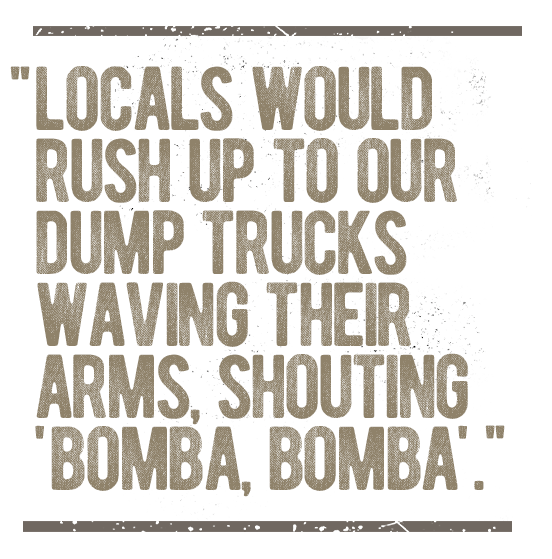

His rapid-fire jokes are interspersed with philosophical platitudes, such as “every day you’re alive is a good day.” Again, this perspective is profoundly rational. A week after our meeting, Gardiner attended the Perth funeral of YPG volunteer Jamie Bright, 44, shot dead in Syria in May. He first met Bright when both were young Army sappers at the School of Military Engineering at Steele Barracks in Moorebank, Sydney. Last year, in Syria, the men stumbled upon one another, again in uniform.
“I know you!” Gardiner had said.
At the funeral – where Bright was farewelled with Kurdish battle songs, his coffin draped in the militia’s flag with its red star emblem – Gardiner comforted his late comrade’s adult son, mother and siblings. “We talked for hours,” says Bright’s twin brother Andrew, who plans on visiting Syria one day “to find out why Jamie went there.”
About a year before his death, Bright lost his passport in Syria. He wanted to retrieve it from the combat zone, but according to Andrew, “Matthew said to him, ‘nah mate, you go back there, you die.’ So unofficially, Matthew saved Jamie’s life for 12 months”.
He gives a sad laugh: “I have great respect for Matthew; he and Jamie knew how to keep secrets.”
When Queenslanders Reece Harding and Ashley Johnston were killed fighting with YPG militia last year, Gardiner contacted their grieving families, assuring them their sacrifice was not in vain.
On his return to Australia, an ABC report noted Gardiner “looked healthy and appeared to have lost weight.” Dressed in a black t-shirt and jeans, he’s still fighting lean, despite all the time he’s spending in pubs. And though his eyes are watchful, he has the simmering intensity of someone all but bursting to tell his story.


From adolescence, Gardiner was an avid reader. The only child of union delegate parents – his father a clerk, his mother an employee of the NSW State Lottery Office – Gardiner devoured the novels of John Steinbeck and Ernest Hemingway, notably For Whom the Bell Tolls, the latter’s classic portrait of the International Brigades fighting alongside the Republicans against Franco’s fascists during the Spanish Civil War. His years at the multicultural melting pot of Parramatta High, in Sydney’s west, taught him “how to swear in seven languages”, but otherwise failed to fire his imagination. Almost every male in his family having served in the military, Gardiner hankered for the Army. He tried to join, unsuccessfully, at 16. A year later, he got his wish.
“I always joke about wanting to join the Army because there’s less rules. I had a strict upbringing; my parents didn’t want to spoil me.”
The army was home for the next decade. Gardiner obtained his Higher School Certificate, trained as a combat engineer and later as an engineering surveyor.
One evening in early 1993, he saw on the news that Australia would send troops to civil war-torn Somalia as part of a US-led multilateral humanitarian force. Gardiner belonged to the 3rd Brigade overseas deployment force and knew immediately what would happen. Within 24 hours he was ordered back to Townsville; 28 days later his First Battalion Group was in the Somali capital Mogadishu, followed by Baidoa in the south – known as “the city of death”.
His battalion’s role in Operation Solace included sweeping territory for land mines and unexploded ordinance, and building infrastructure. They extracted bombs from the wells, erected schools, court houses and jails – in the first jail they built, local leaders executed a bandit almost as soon as the cement had dried.
“The locals knew we were the bomb people: we were their entertainment. They would rush up to our dump trucks waving their arms and guiding us to the right places, shouting ‘bomba, bomba’.”
One night, in a village near the town of Burhakaba, Gardiner and his section commander stumbled on an unoccupied hut.



“There was a box in the middle of the hut and it could have been booby-trapped. One of us had to deal with it. My corporal was married so I said, ‘okay, you stay outside’. Turned out the box was an end cap from an agricultural pipe.”
His tour lasted four months. He received his active service medal from a government minister on the flight deck of HMAS Tobruk. When years later Gardiner was introduced to Labor’s John Faulkner, he said, “I’ve met you before.”
At 27, Gardiner felt restless again. He had met Andrea about two years earlier while stationed in Townsville; she was studying nursing at James Cook University. The pair was now itching for travel, so he resigned from the Army. His grand tour overseas saw him working as a hausmeister (caretaker) in a 400 year-old chalet near Innsbruck, a security guard in London’s Hayward Gallery, and a surveyor’s assistant on the construction of London’s Millennium Dome.
“If you dive down to the bottom of the lake there, you’ll see my initials spray-painted on the concrete,” he grins.
Returning to Australia, Gardiner figured his best option was to back his existing skills with formal qualifications and study surveying. He was accepted into Queensland University of Technology in Brisbane. But when, in the early 2000s, the bottom fell out of the construction industry, Gardiner switched courses midstream, enrolling in nursing. Andrea and his in-laws being in the profession, he knew what he was getting himself into. After the blokey culture of the army, the nurses’ “smoko room” was an education in celebrities and handbags.
He thrived in the “unstructured chaos” of the emergency department and, being a military man, he was also primed to the challenges of the operating room where “everything’s controlled, but when something goes wrong, it goes spectacularly wrong”.
As Andrea’s close family lived in Darwin, Gardiner shifted to an accelerated nursing course at Charles Darwin University. He got a job at Royal Darwin Hospital. True to his roots, he served as the union rep for graduate nurses, then for theatre nurses. When someone from the nurses’ union went on maternity leave, Gardiner got a job as an organiser. Evidently, he developed a reputation as a canny operator because 18 months later the state secretary of the Miscellaneous Workers’ Union – which changed its name to United Voice in 2011 – offered him a job as a lead organiser. Within a year, in 2007, he was “the first local secretary of the ‘missos’ in 10 to 15 years.” It was an adequate consolation prize for narrowly missing out on pre-selection for the Federal seat of Solomon the same year.

![[L-R] Gardiner as an Australian soldier, his patches, and at ease in the Army. [L-R] Gardiner as an Australian soldier, his patches, and at ease in the Army.](http://web.archive.org./web/20170409021839im_/http://www.sbs.com.au/topics/sites/sbs.com.au.topics/files/shorthand/15232/media/in_line_1-lr.jpg)
[L-R] Gardiner as an Australian soldier, his patches, and at ease in the Army.

At the moment when he felt the magnetic pull of an overseas battlefield, Gardiner was not only state ALP president, but also treasurer of the peak union body, Unions NT. He was regarded as a safe pair of hands.
“I’ll tell you what was the final straw…” Gardiner reaches for his iPhone. He calls up a news story from – of all places – Sydney tabloid The Daily Telegraph. Dated November 2014, the story reports on four brothers from Gardiner’s home turf of western Sydney attempting to join IS in Syria. The report quotes Muslim community leader Dr Jamal Rifi remarking that as two of the siblings weighed more than 140kg, they would almost certainly be too unfit for terrorism training. Even now, Gardiner clenches his jaw at this article with its absurdist headline about the “Aussie jihadists ‘too fat’ to fight.”
“I mean, they were too fat for jihad…” He shakes his head.
“And this was when over a thousand Yazidis were taken (by IS) as sex slaves”
“These guys weren’t going to Syria for ideology; they wanted to rape and pillage. I thought, ‘this is not Australia, this is not what we stand for. And if this is happening then we need someone on the other side, the good side.’ And I thought, ‘I have to go. No ifs or buts’.”
“But you have a family, children..?”
“Did you see the footage of the Yazidis being evacuated from (Iraq’s) Mount Sinjar? Those parents throwing their children at the helicopters, so desperate to get their kids to safety? It’s a question of what kind of world do you want your own children to grow up in. I knew my children would understand. To the question, ‘what does your dad do?’ they’d answer, ‘he helps people.’”
As union boss, Gardiner always gathered intelligence on his employer opponents. He never embarked on an industrial fight without knowing everything there was to know about, say, the company manager who faced him across the boardroom table. How secure was this person within the company? What were their likes and dislikes? Who were they sleeping with? You can take the man out of the Army, but you can’t take the Army – and its warrior creed of ‘know thy enemy’ – out of the man.
So having made his momentous decision, Gardiner once again gathered intelligence, frantically researching IS – he prefers the name “Daesh” because this denies the group legitimacy and avoids tarring ordinary Muslims with the terrorist brush – and the myriad actors in the Syrian civil war.
His reading led him to the anarcho-socialist experiment in Kurdish-controlled Rojava, a verdant, roughly 400km stretch of northern Syria between the Tigris and Euphrates rivers. He learned how, in the instability wrought by the Arab Spring protests of 2011, some 2.2 million Kurds created a loosely-federated quasi-state encompassing a patchwork quilt of ethnic and religious minorities. He discovered the YPG militias, the de-facto military of Syrian Kurdistan who, alongside allied guerrillas, were beating back IS troops on the ground, even as next door a hostile Turkey frustrated their nationalist ambitions. He learned the militias had all-female combat units.
With a new imperative of ‘know thy friend’, Gardiner read the Rojavan constitution, noting its entrenched commitment to gender equality and secular democracy in a region blighted by regressive politics. He came to see the Rojavan Kurds, and the dozens of Westerners fighting in their ranks, as almost the contemporary equivalent of the Spanish republicans and the International Brigades in their prescient war against fascism in the 1930s.
On Facebook, Gardiner contacted a woman known as Kader Kadandir, whose name had been linked with the recruitment of Westerners to a YPG brigade known as the Lions of Rojava. Then, in homage to the journeys of his literary hero Hemingway, he booked his ticket. Departure date: 15 January 2015.

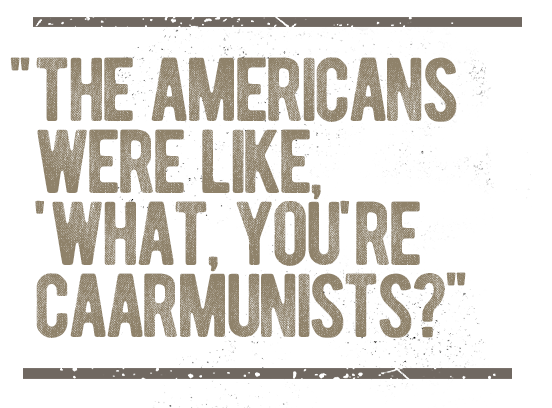

Later that month, when the news broke of Gardiner’s flight to Syria – he says his family never spoke to the media – Kadandir wrote on Facebook that she had not known he was a “political man”. “But I have shock now,” she added. A man from Perth admonished her: “He was a normal family man. You appear to have helped change that. Shame on you.” One former union colleague expressed admiration for Gardiner, describing him as a passionate “but also level-headed” bloke.
The AFP announced it was investigating him. Attorney-General Brandis said it was illegal for Australian citizens to support any armed group in Syria and those who go to fight “face up to life in prison upon your return to Australia”. Immigration Minister Peter Dutton said, “We don't want to see cowboys running off, whether or not they have been trained, or whether they were part of the Australian Defence Force.”
Labor leader Bill Shorten said he did not know what triggered Gardiner’s actions, “but he needs to come home”.
“Whatever the guy’s motivations, he’s not going to solve anything by going there and my thoughts are with his family, actually.”
In a move that still stings Gardiner, the party, citing the “serious reports,” immediately stood him down as NT president and suspended his membership. Some party members speculated he was angry about missing out on pre-selection for Solomon.
In al-Hasakah province, the YPG commanders bunched the Western volunteers together. When Gardiner arrived, there were around 15 all up. He soon clustered with four others – two Americans, a British national and a Frenchman – to form a core inner group of senior ex-military, with combined experience from the French Foreign Legion, French Marines, and the US Army and Marines.
“People who throw around the term ‘solidarity’ don’t know what that means,” he says. “But the look on the face of a Kurdish fighter when you turn up and say, in Kurdish, ‘I’m from Australia and I’m here to help’...”
It had taken Gardiner little time to figure out that survival depended not just on dodging the bullets of the IS snipers taking cover in churches, schools and hospitals, but also on steering clear of Dutton’s “cowboy” Westerners. Americans, for instance, still pumped with adrenaline from the Iraq campaign and alarmingly ignorant of this yet more complicated war zone. Although, Gardiner laughs, even the more sophisticated Americans found the ideological milieu as confronting as the flat bread with salted goats cheese passed around for dinner. Some were genuinely shocked to discover their Kurdish brothers-in-arms, while avowed secularists, were culturally Muslim, and more rattled still when they learned of the YPG’s Marxist politics.

![[L-R] A pro-YPG poster, Matthew Gardiner with the Rojava flag, and the late Australian YPG volunteer Jamie Bright, who was shot dead in May 2016. [L-R] A pro-YPG poster, Matthew Gardiner with the Rojava flag, and the late Australian YPG volunteer Jamie Bright, who was shot dead in May 2016.](http://web.archive.org./web/20170409021839im_/http://www.sbs.com.au/topics/sites/sbs.com.au.topics/files/shorthand/15232/media/in_line_2-lr_vrk4vfd.jpg)
[L-R] A pro-YPG poster, Matthew Gardiner with the Rojava flag, and the late Australian YPG volunteer Jamie Bright, who was shot dead in May 2016.

“The Americans were like, ‘what, you’re caarmunists?’” Gardiner says, mimicking a southern drawl.
Other, more-clued up Westerners respected the Kurdish militias as the most effective resistance against IS, even if they viewed their utopian agenda with some scepticism. One British volunteer using the 'nom de guerre' of Macer Gifford – who at the time of writing had returned to Syria after a period of leave in the UK – is reportedly a former currency trader and Tory councillor. (Gifford has spoken openly about his experiences in Syria because the laws in the UK, and for that matter the US, do not automatically criminalise volunteers with foreign militia.)
“We had some fierce political arguments,” Gardiner says.
Whatever their ideological inclinations, the Westerners looked on with awe – and occasional bemusement – at the Kurds’ commitment to military democracy. After a soldier fell asleep during guard duty, a meeting of his peers was called to decide on his punishment. On another occasion, during a visit to an Assyrian church that had been targeted by IS, Gardiner, in a casual gesture, left a cash donation. He was immediately reprimanded by his Kurdish comrades, who explained the YPG must be above any charge of religious or sectarian bias.
But it was also true, he explains, that the key to safely navigating the cantons and ethnic enclaves of a newly disintegrated Syria is understanding the “war of the flags”. Drive into an area controlled by a particular militia and you had better ensure the right flag flaps at the bonnet.
At night, people debated politics and philosophy around the campfire. It sounds impossibly romantic, except the discussion was mostly in Kurdish, and Gardiner’s Kurdish phrasebook only really equipped him to identify the body parts he treated for injuries and bullet wounds. “A lot of Kurds called me a doctor,” he smiles. “I told them I was not a doctor but they couldn’t get their heads around a man being a nurse.”
He met a Kurdish female fighter known as Seran Altunkilic, “a geneticist, a PhD candidate, worked in Italy, was educated in Istanbul, spoke several languages,” including, crucially for him, English. She became his best friend. “She was going to go back to Italy to do her PhD when her work was done.”
When the work was done, the pair vowed, each would visit the other’s home town.
As the temperature fell below zero, everyone slept huddled together “in the middle of nowhere, in the open, on the ground”. On one bitterly cold night, Gardiner “snuggled up to this little Kurdish guy,” taking turns at spooning on one side, then the other.
At one point during his time in Syria, Gardiner reached an internet cafe. Holding his breath, he googled himself, saw the number of results and immediately went off-radar.
“You know you’ve made it when you’re on CNN,” he deadpans. “The downside is you have a bounty on your head, and for ISIS it’s higher for Westerners.” Some of the Kurdish fighters told him the publicity had inflated his value tenfold: whereas IS paid $US20,000 for a standard kidnapped Westerner, for him they were willing to fork out $US200,000.
And that’s a telling illustration of how Western volunteers, however well-intentioned, can do more harm than good in the Syrian conflict, says Deakin University’s counter-terrorism expert Professor Greg Barton. “There’s a certain logic, and a positive impulse, to picking up a Kalashnikov and joining the brothers. But the publicity Westerners generate and the language and cultural barriers can become a liability for the group – and the volunteers might find they struggle to make a contribution.”

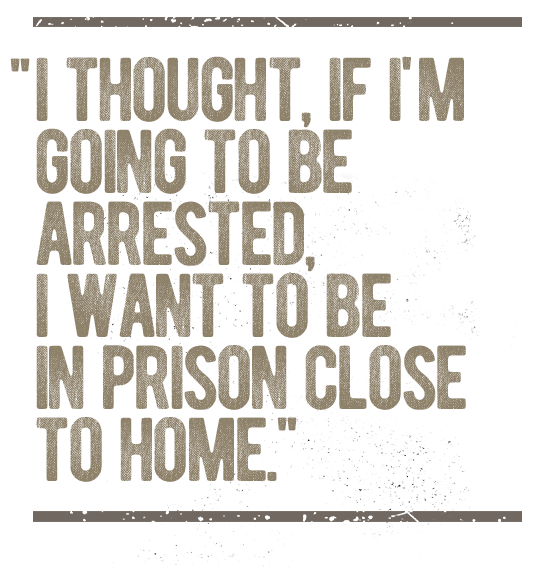

“So you ask if I made an impact over there.” Gardiner is reaching for his phone again. He calls up a Wikipedia reference about the Eastern al-Hasaka offensive with colour-coded before-and-after maps, indicating the territory that changed hands. For a period of three weeks and three days between 21 February and 17 March last year – as the speculation about his absence swirled in Australia – Kurdish and allied militia liberated the major towns of Tal Hamis and Tel Brak from IS control. Coming only months after the Kurds’ stunning recapture of the Syrian-Turkish border town of Kobanî, the offensive was an important strategic victory because it disrupted the north-eastern corridor that had connected the IS de facto capital in Raqqa with its stronghold of Mosul across the border in Iraq.
In a fierce counter-offensive, IS kidnapped more than 200 Assyrian-Christian civilians from around Tel Tamir.
When Gardiner speaks of the battles, it is conspicuously in second person, “when you see this”, “when you do this”. But each sentence comes out faster than the last, and the colour rises in his cheeks.
The Kurds secured these gains, Gardiner says, despite being outnumbered and outgunned, their 40 year-old AK-47s a pathetic contrast to the enemy’s “brand new American stuff”, shiny M16s, armoured Humvees. What the Kurds did have, however, was US air cover. “You see the AC-130 gunship and say, ‘yep, thanks very much’.”
Towns reclaimed from IS had a post-apocalyptic feel.
“You come into a town of high-rise buildings and there’s no-one, totally empty,” he recalls. “And when there’s a population that’s been removed, enslaved or killed and no-one’s there… it’s a haunting feeling.”
Etched in his memory is the sight of the women reaching the checkpoints in liberated areas and immediately ripping off their face veils.
“You saw women taking off their niqabs with just dresses underneath, people losing all their inhibitions. That’s really liberation.”
One day in February, as the offensive raged, a Kurdish fighter informed Gardiner, “your friend got killed”. He was referring to Queenslander Ashley Johnston, another volunteer with YPG and reportedly the first Westerner to die in battle against IS. Gardiner had met him a couple of times.
Knowing that news of Johnston’s death would break in Australia, he sent a text message to Andrea. Gardiner says he texted her once a week, each time from a different mobile phone so his location could not be traced. But nor could she reply to him. “I’m safe and well,” he told her.


Gardiner leaps up from our table at a Malaysian restaurant – our drink at the pub having merged into dinner – for a smoke on the footpath. “I can’t complain,” he shrugs. “I spent years fighting for ‘no-smoking’ zones for hospitality workers.”
Also on the theme of self-sacrifice for the greater good, I asked whether he followed YPG procedure in always carrying one extra bullet – to ensure he’d never be captured alive.
No. Westerners had other contingency plans, is all he’ll say on the record. But Gifford, the former Tory councillor, said in a media interview from Syria last year: “I’ve got a grenade in my pocket and I’ll take them with me.”
Gardiner pauses for dramatic effect. “There’s no way in the world you’re going to be seen in an orange jumpsuit.”
A contingency plan is one thing, a suicide mission is something else entirely, and in April he feared he might have signed on to the latter. There were critical differences in strategy between YPG’s Kurdish commanders and the more professionally trained Westerners. He understands these differences have since been resolved, but the commanders weren’t making decisions fast enough, so Gardiner and several other western volunteers decided to bail.
Approaching the Iraqi border, they made sure the flag on their car matched the flag at the checkpoint. And they slipped out of Syria.
Gardiner took the long way home. From Sulaymaniyah he passed through Stockholm, London and Hong Kong, finally arriving in Singapore where he could get a direct flight to Darwin. “I had to get to Singapore because I thought, if I’m going to be arrested, I wanted to be in prison close to home.”
The passport control officer in Stockholm, bleary-eyed at around 3am, looked at Gardiner’s passport, looked at her screen, looked back at his passport, then back at him.
“And she said, ‘What is your reason for coming to Sweden?’” Gardiner flips to a pitch-perfect Scandinavian accent. “And I said, ‘I’m going home to Australia’. And she slid back my passport, looked me in the eye and said, ‘Good.’”

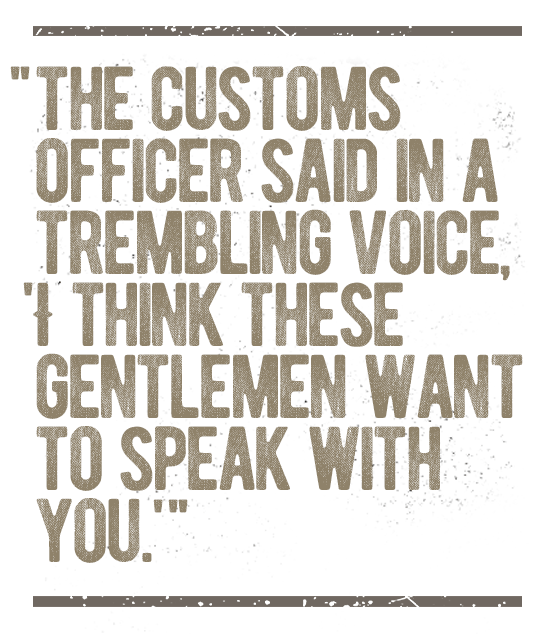

In Singapore he ran into an ABC radio reporter he knew – clinching the broadcaster an exclusive on his return home.
“And in Darwin at customs and quarantine I stood in the ‘Something to Declare’ aisle – because, well, I had something to declare,” he grins, turning his palms up theatrically. “I had been to a farm in the past month, I had four packs of tobacco rollies.
“But then I also had two uniformed AFP officers behind me, and two detectives in front. And the customs officer said in a trembling voice, ‘I think these gentlemen want to speak with you.’”
“So I got to keep the tobacco.”
In the airport interrogation room, the AFP officers produced the list of mobile phone numbers he used to send messages to Andrea. They took swabs from his hands. He watched as they tested all his belongings for gunshot and explosives residue and photographed each one. They confiscated his electronic equipment and his Kurdish phrasebook. They picked years-old spear grass from his Explorer socks.
The interrogation lasted eight-and-a-half hours. Gardiner exercised his right to silence.
“And then the coppers drove me home.”
Andrea was anticipating his arrival – he had texted her to say he was coming home. “But the Federal Police had searched the house under warrant that morning, so it might have been bugged. We had lots of conversations in the backyard.”
As for the tone of those conversations, Gardiner says “she was more relieved than anything else”. Yet clearly there was a bit of “else”, because he learnt “the bastards at Australia Post” took two days to deliver his farewell letter to his family. For two anguished days Andrea imagined he had been in a car accident en-route to Alice Springs and was dying in the outback. She imagined all sorts of things.
His homecoming was on April 5, Easter Sunday. One year later, Easter 2016, Gardiner’s eldest son remarked, “this is the second-best Easter I’ve ever had.”
The day after Gardiner came home, journalists arrived on his doorstep. He asked them not to reveal his address – after all, he’s on the IS hit list – but otherwise said little. Three weeks later, after two television current affairs programs aired segments on Kurdish female fighters, he tweeted vague but tantalising references to his time in Syria.
Then, in May 2015, about a month after his return, his friend, Seran, the geneticist, was “martyred” in battle. He posted a Facebook tribute with her photo – a young woman in khaki, her hair tied back, her unsmiling gaze trained directly at the camera. Her image framed against the background of the YPG flag with the red star. Thereafter, Gardiner began memorialising other fallen comrades, Kurdish and Western, his Facebook feed a lonely vigil for casualties in a war at once both urgent and remote.

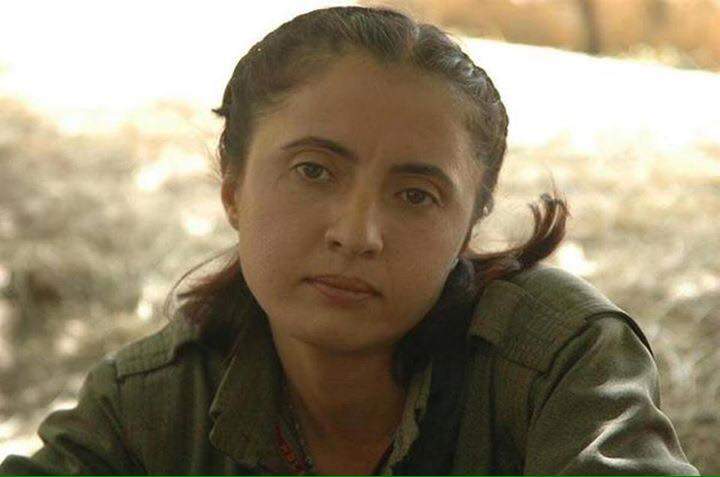
Kurdish fighter and geneticist Seran Altunkilic, who spoke English and became Matthew Gardiner's best friend, died in battle in May 2015.

Meanwhile a fan club of strange bedfellows was lionising him. As a military man in the left, Gardiner is accustomed to feeling like a political orphan: leftists are suspicious of his army background, the right suspicious of his union activism. But irony takes on an entirely new meaning when the late Labor icon Bob Ellis writes a poem about you (“he’s a legend”) at the same time as conservative columnist Miranda Devine advocates your cause. (“I felt unclean,” smirks Gardiner.) And being scrupulous about his homework, he almost certainly read a column of mine in The Age, published four days after his return, criticising the conspicuous absence of “comradely support” for Gardiner on the left.
When he speaks about his ostracism from the Labor Party, his hurt is palpable.
“I was disappointed with the ALP’s response… for being so risk averse. A party official said to me, ‘We knew the AFP were investigating you; for all we knew it could have been for kiddie porn.’ Yeah, right. I reckon that because of the trade union royal commission, no-one wanted to have their heads above the parapet.”
He reckons people are still ducking for cover, especially when his CV lands on their desk. He knew there was no going back to United Voice; a former secretary would only get in the way. And he insists – when I ask whether his sudden departure had thrown the union into chaos – he had long ago implemented military-style “succession plans”, equipping his deputy to seamlessly take over from him should the need ever arise. (The union’s current national secretary, Jo-anne Schofield, declined to be interviewed.)
Still a registered nurse, Gardiner sought jobs in health. He sounded out the clinical heads at his old stomping ground, Royal Darwin Hospital, and got a positive reception. So he formally applied for a position. Weeks later, he received what he suspects is a heavily “legalled” rejection letter, citing his lack of recent clinical experience. He offered to work for free until he passed his “competencies”. The answer was still “no”. (The hospital says it does not offer unpaid work.)
He applied to just about every health sector employer in the state – remote services, private hospitals. The answer was always the same.
Nothing to be done, says Gardiner. Union activism coupled with overseas adventurism makes him a tough sell. But he’s excited about the opportunities in law. Recently, he interned with a firm involved in high-profile human rights litigation against the Immigration Department for the mistreatment of asylum seekers in offshore detention.
He runs me through a creative legal argument that uses occupational health and safety laws to claim the Government owes the detainees a duty of care – “I helped come up with this,” Gardiner explains, with dogged conviction and intoxicating optimism.
In the meantime he supports himself with two part-time jobs: as a consultant for the NT’s Council of Government School Organisations, a not-for-profit advocacy group for public schools, and as a manager at Woolworths.
“The worst thing about Woolies is that I had to join the SDA,” he says, with signature wry grin, referring to the right-wing Shop, Distributive & Allied Employees Association. Not hard to see why the Kurds’ internecine war of flags – which Gardiner predicts will explode once the common enemy, IS, is defeated – was never going to faze a veteran of Australia’s factionally-riven union movement.

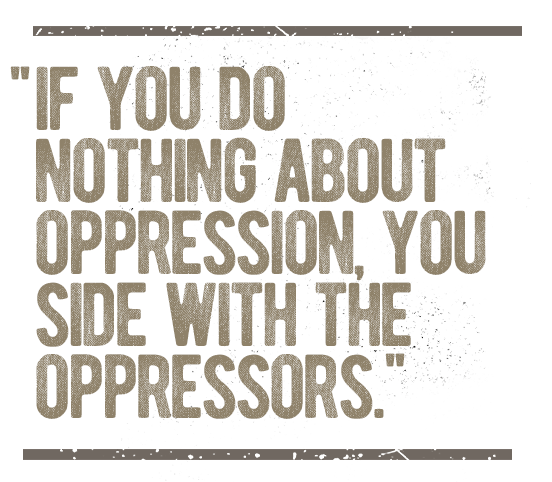

A few months ago, he and Andrea separated “amicably” after 20 years of marriage. He now lives in student accommodation.
Was the break-up a consequence of his fateful decision?
“Yes and no.”
The following night on Darwin Cup weekend, in another Asian restaurant, Gardiner has been in full flight for a couple of hours, “level-headed” and “passionate” as his union colleague observed. The situation in Syria is “complex”. Western boots on the ground are not necessarily the answer. But why no outrage about weapons and fighters passing to IS across the border of Turkey, a NATO country? The YPG being accused of ethnic cleansing and other human rights violations? Well, there are two sides to that story.
Gardiner tells me that a few weeks after his return, he actually invited the AFP to ask him questions. He figured he had valuable information to share about IS, including its Australian recruits. “I didn’t use the phrase ‘operational intelligence’, and I said, ‘I won’t tell you what I did – I won’t tell you anything that might be incriminating – but I can tell you what I saw’. I could tell them things that might help prosecute these bastards for war crimes.”
A year later, an AFP counter-terrorism official sent him a list of questions. Gardiner duly produces the list on his iPhone. They are all in the vein of “where did you go overseas?” “who did you associate with?”. In other words, questions concerned with building a case against Gardiner, in his view, and not against IS. (When asked about this, an AFP spokesperson said the organisation does not comment on operations or matters of intelligence.)
“Hypocrisy,” he scoffs. “If you do nothing about oppression, you side with the oppressors.”
But his tone is always gentle.
“I know what I did was right. I made a difference; but I’m not going to get recognition, not in my lifetime. If you go to Lake Burley Griffin (in Canberra) there’s a memorial for people who fought in the Spanish Civil War. But the thing is, it took 60 years to get there.”
The lesson, he concludes, is that ultimately “progressives always win”. Look at the struggle for women’s enfranchisement, workers’ rights, Aboriginal land rights.
At the back of the restaurant a waitress begins stacking chairs on tables. We’re the last patrons here.
“So progressives always win,” he says again. “I just wanted to speed up the timeframe.”

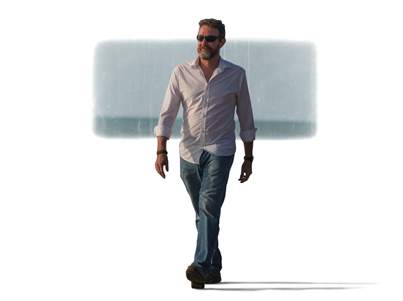

Julie Szego is an author and freelance journalist. Photos of Matthew Gardiner by Territory Rig Media.


